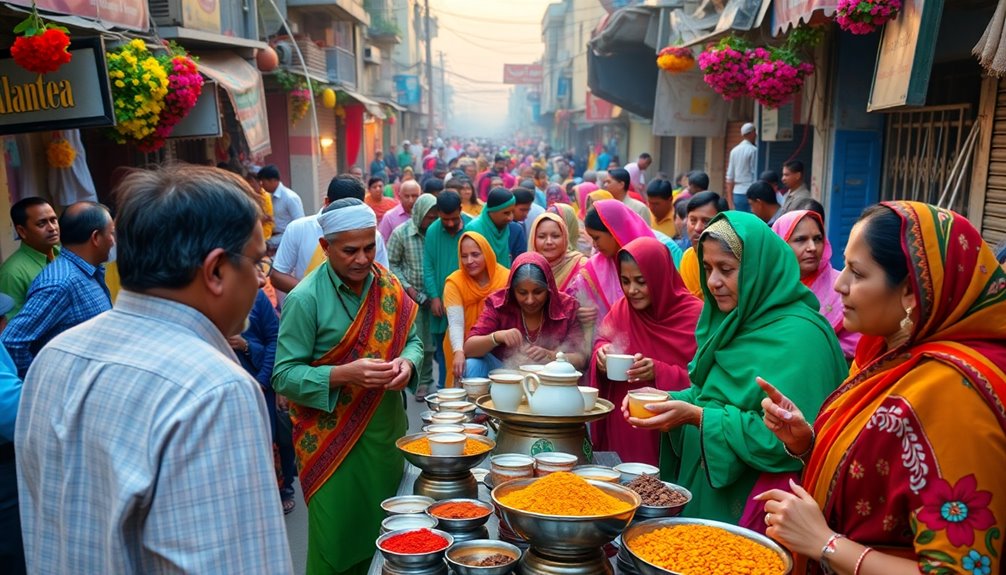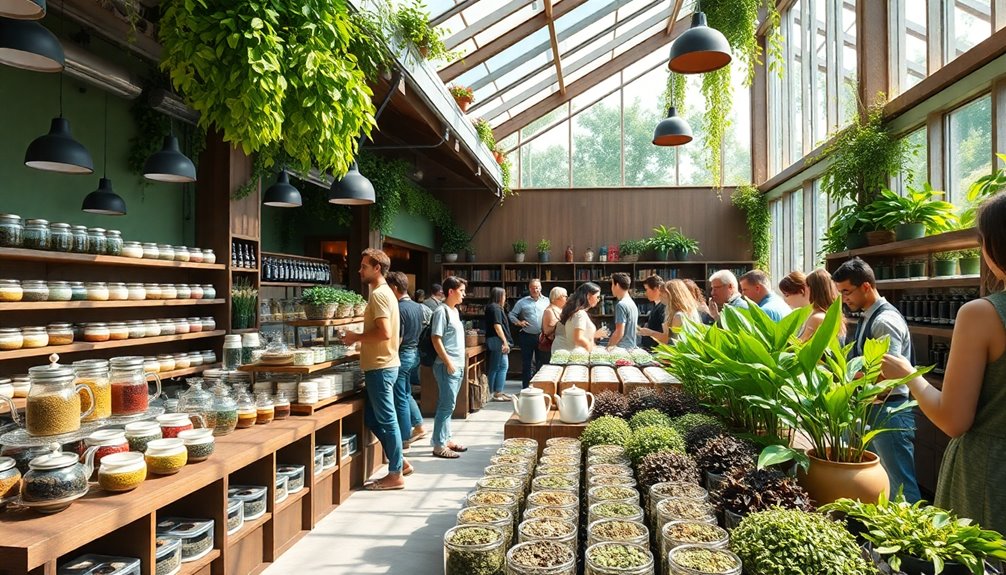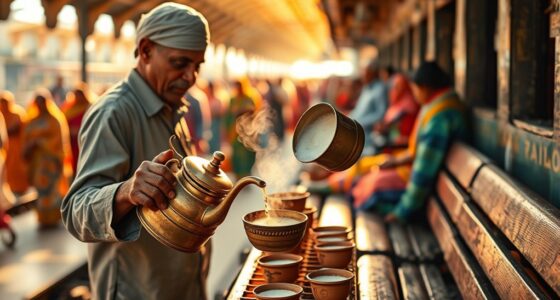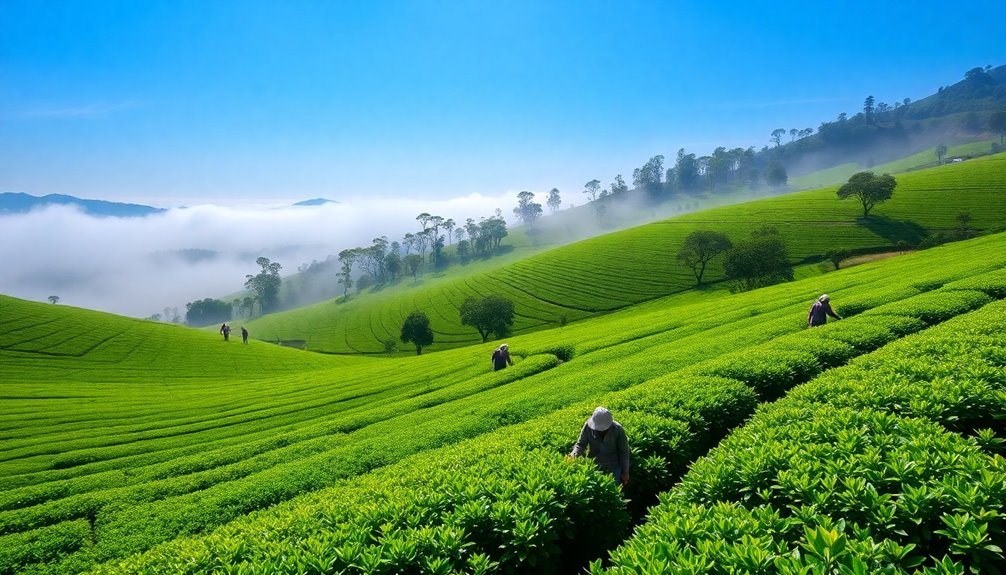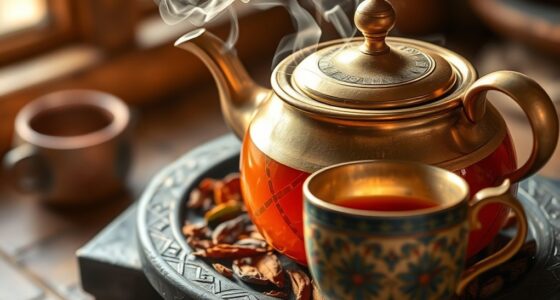Tea is a delightful part of daily life in India, bringing warmth and joy to everyone! Every day, people enjoy sharing a cup of masala chai, connecting friends and families in a lovely way. Here's how tea shapes life:
- Morning Rituals: You start your day with a comforting cup.
- Social Gatherings: Chai acts as an icebreaker at festive occasions.
- Community Bonding: Visits to local chaiwalas create cozy spaces for chats.
With so many flavors across India, from spicy to mild, there's a tea for everyone. Stick around to discover even more about this cherished beverage!
Key Takeaways
- Tea, especially masala chai, fosters social connections and warmth, serving as a daily ritual that unites diverse communities in India.
- Chai acts as an icebreaker during gatherings, facilitating conversations and strengthening friendships among people from different backgrounds.
- Daily tea rituals, such as morning chai or neighborly chats, infuse life with joy and create a sense of belonging.
- Regional variations in tea preparation reflect cultural diversity, with different areas favoring unique flavors and spices that celebrate local traditions.
- Health benefits of tea, including improved alertness and digestive health, contribute positively to daily life and overall well-being in India.
Introduction
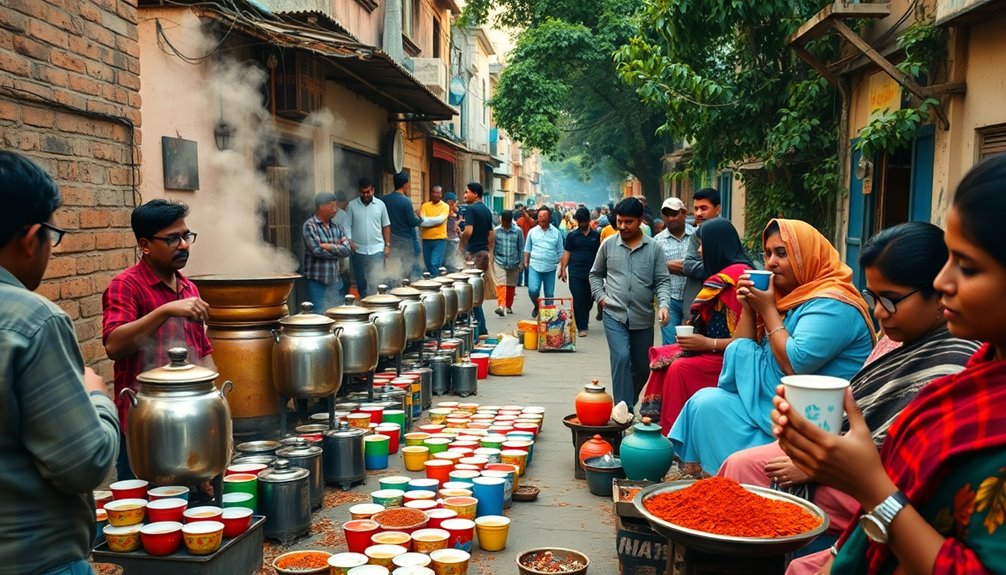
Tea is more than just a beverage in India; it's a daily ritual that connects people across diverse backgrounds. From bustling cities to quiet villages, masala chai is enjoyed by everyone, bringing warmth and togetherness. You might find yourself sipping this creamy drink made with milk and sugar, delighting in its rich flavors.
Chaiwallas, or tea vendors, are everywhere, making tea drinking a fun part of daily life. They serve up fresh cups of chai on street corners, creating a lively atmosphere filled with laughter and chatter. Did you know that the average Indian drinks about 750 grams of tea each year? That's a lot of chai!
Tea isn't just about the drink; it's also about hospitality. When guests arrive, serving chai becomes a cherished cultural ritual. It shows you care and welcomes them into your home.
These simple moments of sharing tea spark social interactions, building bonds among friends and family.
Tea's Role in Social Gatherings

When you gather with friends or family in India, chances are you'll be greeted with a steaming cup of masala chai. This warm gesture of hospitality is at the heart of social gatherings.
Whether it's a casual afternoon chat or a festive celebration, tea serves as the perfect icebreaker, inviting everyone to join in on the fun.
- Masala chai isn't just a drink; it's a symbol of friendship and community. Herbal tea can also offer various health benefits that enhance the overall experience of socializing. In many parts of India, chilli and ginger are often added to chai for an extra kick, reflecting regional variations in preparation. Additionally, the spices used in masala chai, such as cardamom and cinnamon, not only enhance flavor but also contribute to its health benefits.
- Chai-pani, or tea and water, showcases the importance of sharing and caring in daily life.
- You'll often find chaiwallas bustling around, providing a cozy space for people to connect and share stories.
As you sip your chai, conversations flow easily. Topics can range from laughter-filled memories to serious discussions about politics.
The act of preparing and serving tea strengthens bonds among loved ones, making moments together even more special. Natural wonders such as beautiful gardens and parks often serve as perfect backdrops for these gatherings.
In both rural and urban settings, tea acts as a catalyst for connection, showcasing its cultural significance in India.
Tea as Daily Ritual
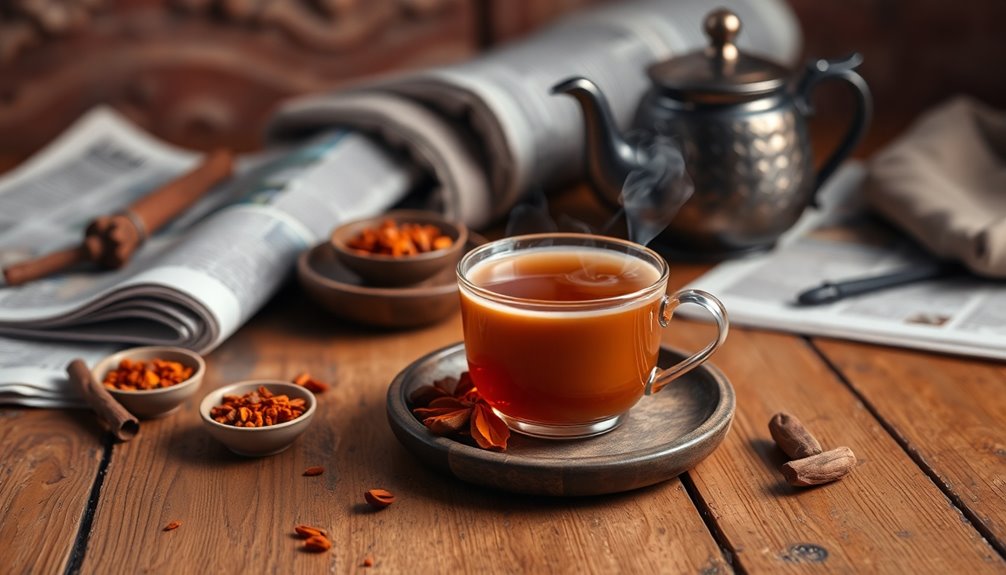
Gathering with friends over a cup of masala chai sets the tone for many daily rituals in India.
Tea, especially masala chai, isn't just a drink; it's a warm invitation to share moments and stories. You might find yourself visiting a local chaiwala, where the air's filled with the sweet and spicy aroma of chai tea. These street stalls are lively community hubs, buzzing with laughter and conversation.
Every sip of chai represents hospitality, making everyone feel welcome. Whether you're enjoying it at a friend's house or at a bustling tea stall, you're part of a beautiful ritual that connects people from all walks of life.
- Tea Moments: You might drink chai in the morning, during breaks, or while chatting with neighbors.
- Cultural Connection: Sharing a cup of chai transcends social boundaries, bringing people together.
- Daily Delight: The ritual of tea drinking infuses daily life with joy and warmth.
In Indian culture, masala chai symbolizes friendship and community.
Regional Variations in Tea Preparation

Across India, the preparation of tea varies significantly, reflecting the rich tapestry of regional cultures and preferences.
In Northern India, you might find Masala Chai, which is a delightful mix of spices like cardamom, ginger, and cloves. This tea is usually brewed with milk and sweetened with sugar, making it a warm and comforting drink.
In Southern India, the tea preparation leans toward a milder flavor, often using black tea, milk, and sugar. Nilgiri teas are especially popular for their aromatic qualities, giving each cup a fragrant twist.
If you're in an urban area, you'll likely encounter Kadak Chai, a stronger and more robustly brewed tea that many North Indians love.
In Assam, the locals enjoy Sah, which is black tea, and Gakhir Sah, which is milk tea. These preparations highlight the region's fondness for rich and strong brews.
These unique regional variations in tea preparation across India not only showcase different tastes but also celebrate the vibrant culture and social rituals tied to tea consumption in daily life.
Health Effects of Tea Consumption
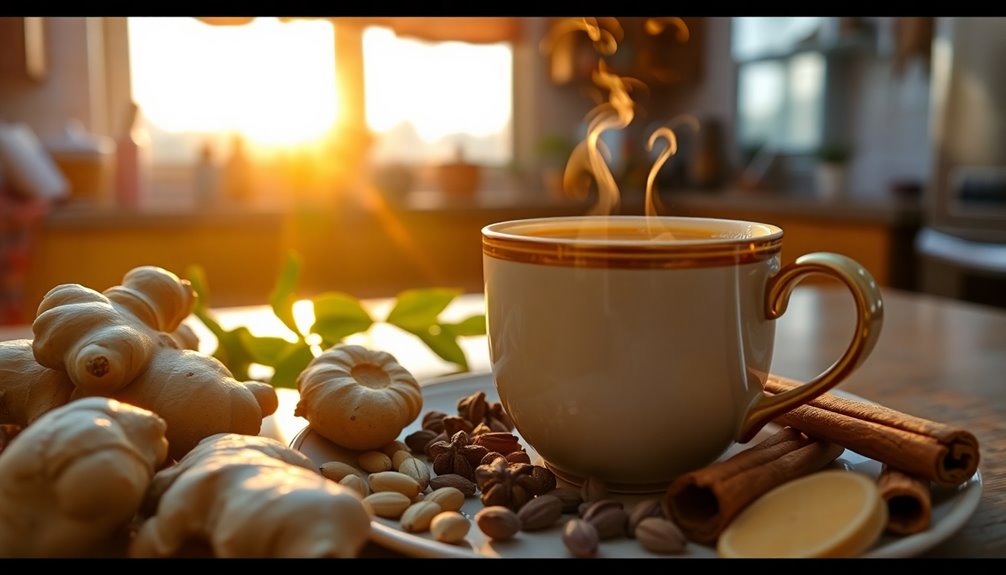
Tea's regional variations in preparation not only highlight cultural diversity but also bring a host of health benefits to your daily routine.
When you sip on a warm cup of black tea, you're treating yourself to powerful antioxidants called polyphenols. These little wonders can help reduce the risk of chronic diseases, like heart disease and some cancers. Additionally, tea contains antioxidants that combat oxidative stress, further enhancing its protective qualities.
You'll also enjoy a nice caffeine boost, typically between 50-100 mg per cup, which can enhance your alertness and focus.
Plus, tea supports your digestive health! The tannins in tea can soothe any tummy troubles you might have.
Drinking tea regularly may even help with weight management and metabolic health. It can support fat oxidation and improve insulin sensitivity, keeping your body in tip-top shape.
And let's not forget about L-theanine! This magical ingredient helps promote relaxation and reduce stress, making tea a comforting choice during your busy day. Additionally, certain teas like green tea have been shown to enhance memory retention and cognitive function, providing even more reasons to include tea in your daily routine.
Practical Applications
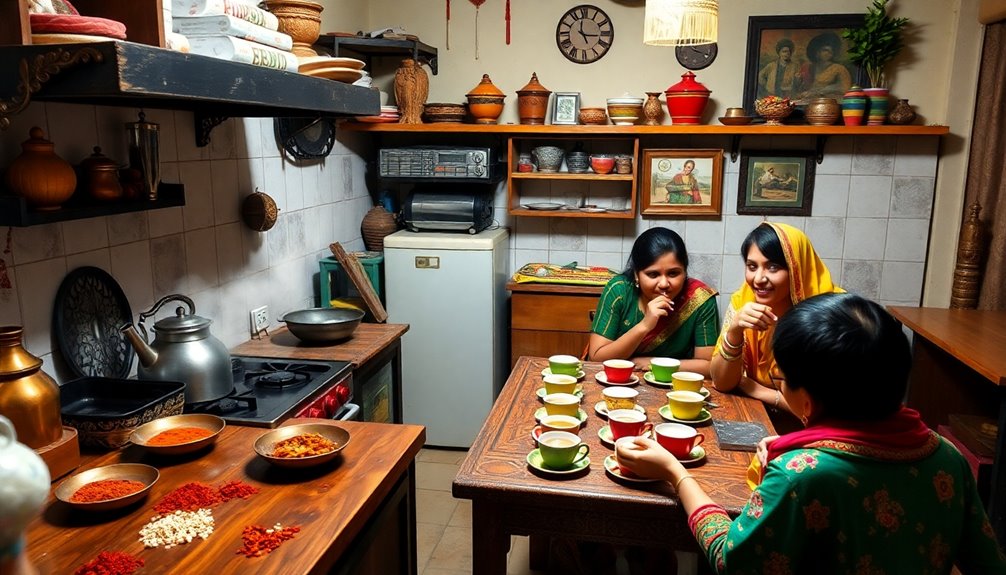
While you mightn't think much about it, incorporating tea into your daily routine can have a profound impact on your lifestyle. Imagine starting each morning with a warm cup of masala chai, filled with spices that tickle your taste buds. It's not just a drink; it's a daily ritual!
Tea plays a vital role in hospitality, especially when you invite friends over. You'll often serve tea during social gatherings, showing warmth and kindness to your guests. Plus, when you buy from local chaiwallas, you're not just enjoying a delicious beverage; you're supporting their livelihoods and contributing to the economy.
Here are some fun ways to enjoy tea in your daily life:
- Morning Boost: Kickstart your day with a flavorful cup of chai.
- Afternoon Break: Take a moment to relax with tea during lunch.
- Celebrate Together: Serve tea at family events to enhance the joy!
Every sip of tea connects you to rich cultural practices and traditions. So, let's raise our cups and toast to the wonderful role tea plays in our lives!
Frequently Asked Questions
Why Is Tea so Important in India?
Tea's important in India because it fosters connections, offers comfort, and serves as a daily ritual. You'll find it uniting people across cultures, making conversations flow, and creating a sense of belonging in every cup.
How Did Tea Change History in India?
Tea transformed India's history by driving economic shifts during the colonial era, fostering national pride during independence, and becoming a cultural staple. You can see its impact in social customs, agriculture, and unity among diverse communities.
What Does Tea Mean in India?
Tea in India isn't just a beverage; it's a symbol of hospitality and community. When you share a cup, you connect with others, bridging social divides and creating cherished moments filled with warmth and conversation.
What Is the Significance of Chai Tea in India?
Chai tea's significance in India lies in its role as a symbol of hospitality and community. When you share a cup, you're not just enjoying a beverage; you're fostering connections and embracing warmth in everyday life.
Conclusion
In India, tea isn't just a drink; it's a wonderful part of life! From cheerful gatherings with friends to cozy family moments, tea brings everyone together. Each region has its own special way of making it, adding to the fun. Plus, sipping tea can be good for your health! So, whether you're sharing stories or enjoying a quiet moment, remember that a warm cup of tea makes every day a little brighter and more joyful!

